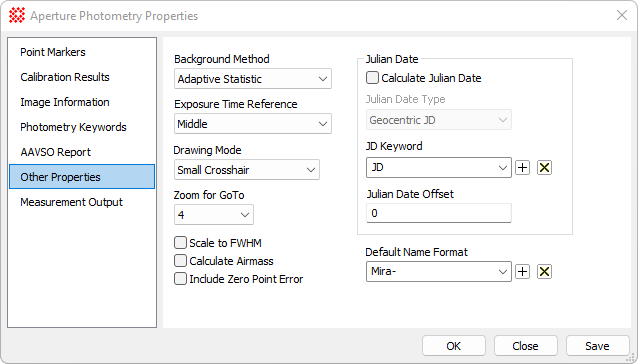|
Table Properties
|
|
Background Method
|
This list box chooses the mathematical method used
to estimate the sky background level from pixels in the outer
annulus. If there are contaminating objects in the background
annulus, choose Modal Brightness, which does a good job of
rejecting outlying values. If the fields of view is fairly sparse
and it is unlikely that any objects contaminate the background
annuli of the stars, the other 2 methods may be chosen.
|
|
Exposure Time Reference
|
This Properties selects the time stamp that goes
into the
Apphot Pane. The time of the observation is
calculated from the date and time of observation from the image
header and the exposure time, following the rule you select
here.
|
|
Drawing Mode
|
This list box provides alternative ways of drawing
the photometry markers on objects.
|
|
Zoom for GoTo
|
Specifies the zoom factor for the Go to Object menu command of the photometry
measurements grid.
|
|
Scale to FWHM
|
If checked, the apertures are scaled to multiples
of the FWHM of the image. This setting requires that the FWHM have
been
measured and is stored in the image header using the
PSF-FWHM
keyword .
|
|
Calculate Airmass
|
If checked, the airmass is calculated for each
image using header keywords specified in the
Photometry Keywords dialog. If not checked, the
airmass for each image is taken from the AIRMASS keyword in the
image header.
Note: This option should be set as desired before marking
points on the image, because the airmass is listed for each
measurement. If you change this option after marking any
points, you can force all points to be re-measured by clicking the
 button on the toolbar or the [Re-center] button on the
Points page. button on the toolbar or the [Re-center] button on the
Points page.
|
|
Include Zero Point Error
|
Check this box to include the uncertainty (error)
of the photometric zero point in calculating the internal error of
the measurement. If checked, the values of Error and Error(T)
include the zero point error added using the root sum of squares.
If you change the check box after measurements are made, click
 to recalculate the
errors in the
Apphot Pane. to recalculate the
errors in the
Apphot Pane.
|
|
Julian Date
|
This group controls the calculation and usage of
Julian Date.
|
|
Calculate Julian Date
|
Check this box to calculate the Julian date from
the image. Uncheck it to use the Julian Date value from the image
header. If using the header value, set the Julian Date Keyword to the name of the header
keyword containing the Julian Date.
The Julian Date can also be calculated outside of
photometry using the
Calculate Julian Date command or a simple
script (see the sample script, "Julian Date Function
Test.lua").
|
|
Julian Date Type
|
Select the type of Julian Date to be reported in
the photometry table. The options are Heliocentric JD, Geocentric
(normal) JD, and Modified Julian Date for both heliocentric and
geocentric forms. The selection is listed in the Photometry
Report; see
Photometric Measurement Definitions.
|
|
Julian Date Keyword
|
This specifies the name of the Julian Date keyword
in the image header when you are not calculating the Julian
Date from the image properties. This property is used only
if Calculate Julian Date is unchecked.
This is a history list which can save new entries and recall old
entries for the keyword name.
|
|
Julian Date Offset
|
Enter the value to subtract from Julian Date
listed in the Apphot
Measurement Pane. If desired, the number may be
fractional, such as 2453000.5. After clicking[Apply] or [Save]
the photometry report is updated with the new Julian Date including
the offset.
|
|
Default Name Format
|
Enter the Prefix to use for the names of marked
stars. A number is appended to this entry to make the default name
for each marked object. However, the default name can be overridden
using the Edit button on the toolbar.
Use the [+] and [x] buttons to add or delete the currently
displayed entry.
|
Mira Pro x64 User's Guide, Copyright Ⓒ 2023 Mirametrics, Inc. All
Rights Reserved.


